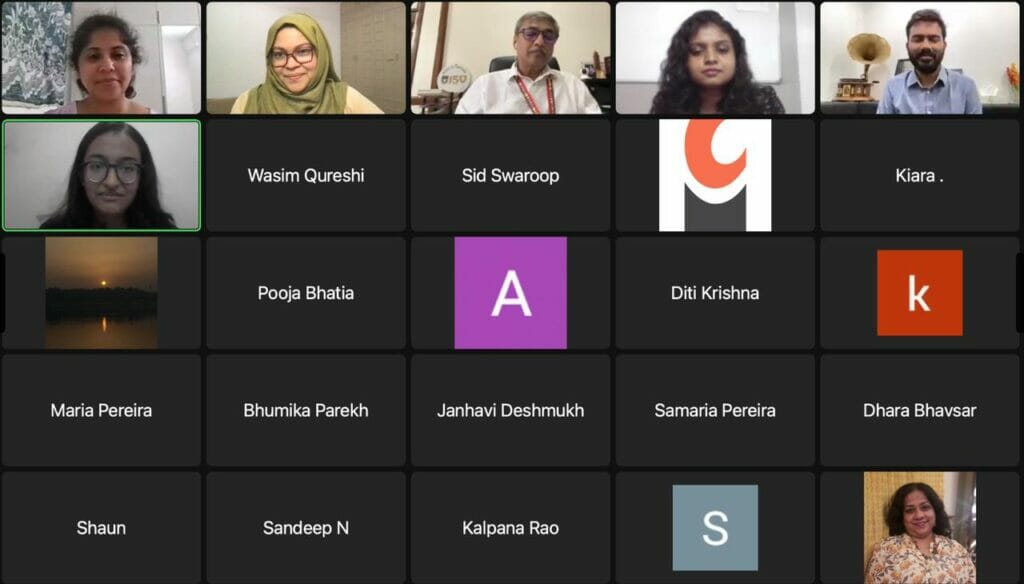With admissions going on in full swing, students all over the country are facing a massive ‘career conundrum’- what choice to make after Class12? It is no longer like the old times when engineering, medicine or law were the only choices. From filmmaking to data science, students have a wide array of choices. However, these very choices create a lot of confusion and pressure for young adults.
Parents pushing their child towards a more traditional path comes with its own pressures, and so does choosing a non conventional path. Consequently, many students battle stress and other mental health issues. On Thursday, Citizen Matters engaged with a panel of experts to find reasons behind this stress and identify solutions in terms of handling stress and making the right career decision.

The panel consisted of Dr. Rajendra Shinde, principal of the St. Xavier’s College in Mumbai, Dr. Syeda Ruksheda, a psychiatrist, Sumeet Jain, a career counsellor and Harshi Mehta, a student pursuing a degree in design from ISDI. The panelists gave some much needed insight on today’s situation and the taboo around non-traditional fields of study, with their years of experience.
Students Perspective
As a student, Harshi shared a first hand account of her experience of opting for a non conventional path with design, and the journey leading up to the choice. She said that after she chose arts after class 10, she talked to a lot of people and her seniors to find out about the field of design. She also conducted a lot of personal research about the courses. Harshi says, “Students need to think about what makes them happy. There is always a midway one should talk to people, explore, research, and even use social media for answers.”
Read More: Integrated coaching: Was it actually banned?
How to make the right choice
Dr. Shinde gave references of the admission procedures in college and how the college guides hundreds of students as they decide on the institution and the course. He candidly remarked, “Half of the students don’t make the right choices”. He adds that one should do counselling, find out their likes and interests. One has to do a self evaluation- What are my strengths? Weaknesses? The right research, self reflection, talking to people, using social media will lead one to the right choice. He also says career is more important than a college. Students make their own career, and not the college.
Financial Management
While pursuing higher studies, the question of finances is crucial. Sumeet Jain advised caution and pragmatism. “Go ahead with what your family can afford and put that money to the best use,” he said, adding that in India most parents finance their children’s college education. He spoke about the return on investment, when it comes to expensive courses in India or abroad. Make an informed choice while considering the finances.
How to cope with stress
Coping with this stress is very important. Dr. Syeda emphasised that not everyone has the insight or the courage to make a choice, and the pressure of making a choice may lead us to a poor decision. “It is okay to make the wrong choice, take suggestions, family support and social support. Most importantly, be brave and be you”. She added that if coping with the pressures becomes difficult, one could always seek professional help. In case students are confused, they can take aptitude tests, career counselling too.
Job or Passion
Dr. Syeda and Principal Rajendra both spoke about having a job or a career and following your passion could be two different pursuits. “All your satisfaction and joy does not have come from the career,” said Dr.Syeda. One can either find a job in their passion, or could also find a balance between the both, echoed Dr. Rajendra. “Job is what you do, and passion is what you enjoy. One cannot deny that only passion may not always provide a job. Make sure you develop your passion, and if passion does not provide, get a job. Explore and build on your interests,” he said.
Role of parents and educators
Parents and educators are certainly the support system for every child throughout their education. Dr. Syeda said, “They do keep children first, but sometimes it may not reflect in the words that they use”. She added that parents should have an open conversation with their child and ask about their likes and dislikes. One should guide them in their journey and not suppress them.
An important takeaway from this session, was that one needs to put away the calendar for success. It takes time to figure out what one wants and to pursue it. More importantly, one needs to talk to people, do research and always remember that it is okay to be confused, help is always out there.
The discussion can be viewed here: Citizen Matters Mumbai Webinar: Career conundrum in 12th grade
Some useful resources
- Counselling and Therapy- https://prafultaandheri.org/
- Career Counselling for study abroad – https://yocket.com/
- Aptitude Tests – https://wellness.xaviers.edu/aptitude-personality-testing
- Government aptitude test centre, Mahapalika Marg, Mumbai – 400001.